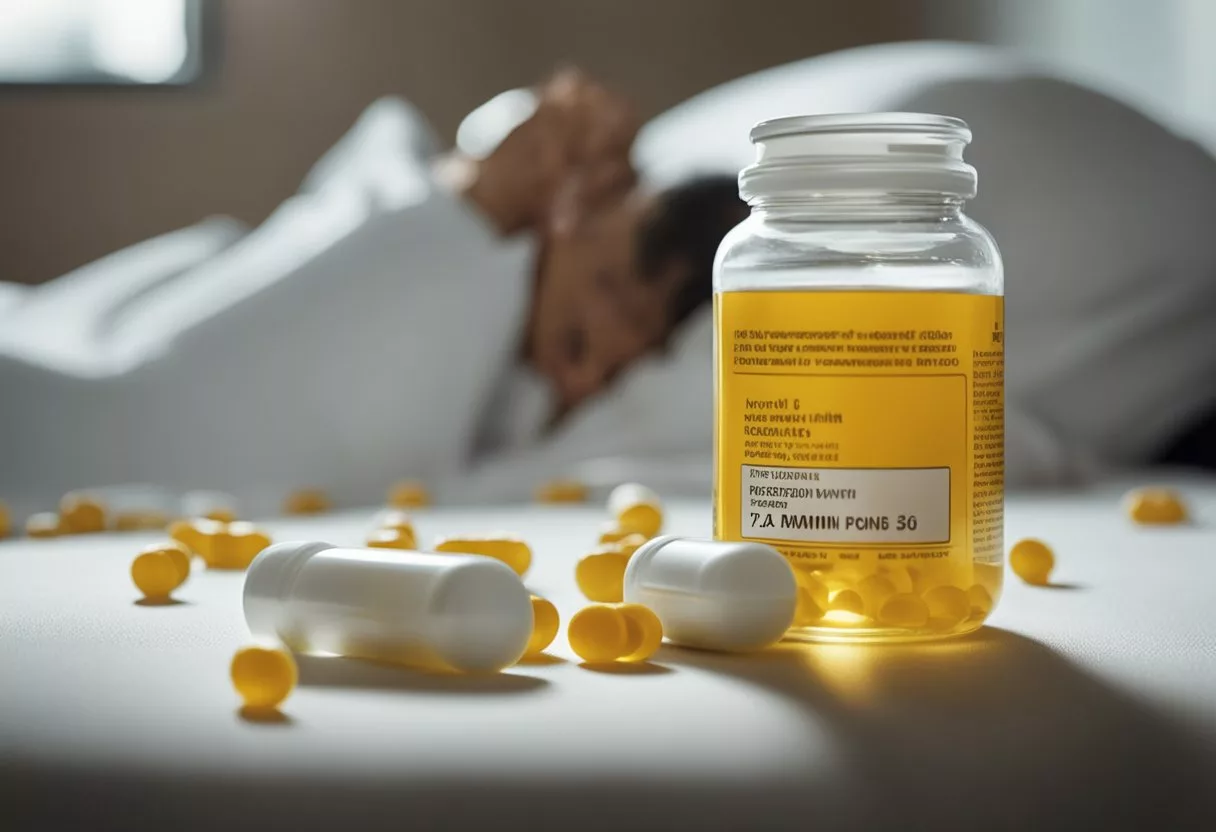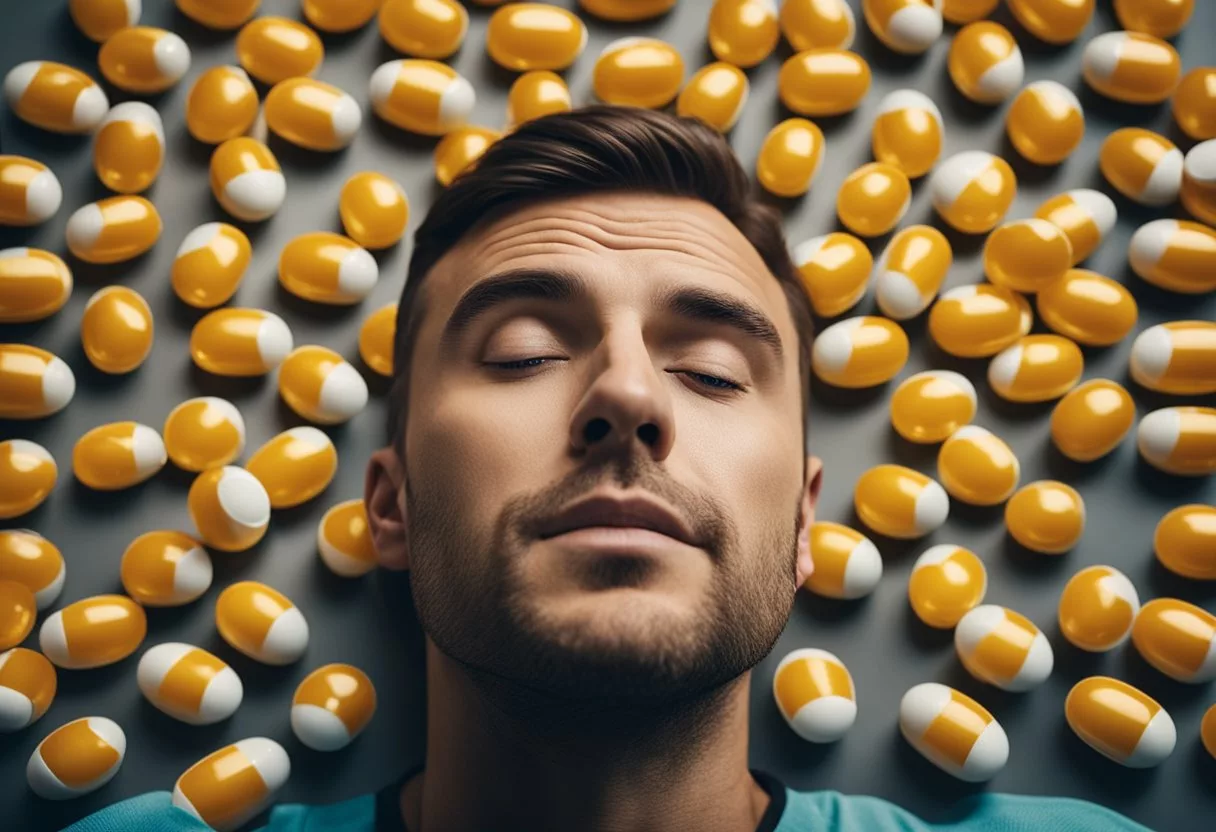Vitamin D plays a key role in our health, but too much of it can be harmful. While many people focus on getting enough of this essential nutrient, it’s also important to be aware of the risks of taking too much.
Taking excessive amounts of vitamin D can lead to a condition called vitamin D toxicity, which can cause serious health problems. This occurs when calcium builds up in the blood, leading to symptoms like nausea, weakness, and confusion. In severe cases, it may even result in kidney issues and bone pain.
Most people don’t need to worry about getting too much vitamin D from sunlight or food. The risk mainly comes from taking high doses of supplements over time. It’s always best to talk to a doctor before starting any new supplement regimen to ensure you’re taking the right amount for your needs.
Key Takeaways
- Excessive vitamin D intake can cause toxicity and lead to health problems
- Symptoms of vitamin D toxicity include nausea, weakness, and confusion
- Consulting a doctor before taking vitamin D supplements is recommended
Understanding Vitamin D and Its Importance

Vitamin D plays a crucial role in many bodily functions. It helps build strong bones, supports the immune system, and keeps muscles working properly.
Roles and Benefits of Vitamin D
Vitamin D is key for bone health. It helps the body absorb calcium, which builds and maintains strong bones. Without enough vitamin D, bones can become thin and brittle.
The vitamin also supports the immune system. It helps fight off germs and keeps the body healthy. Vitamin D is important for muscle function too. It helps muscles move and stay strong.
Some studies suggest vitamin D may help keep heart rhythm steady. It might also play a role in nerve health, though more research is needed on these effects.
Vitamin D Sources: Sun Exposure and Diet
The body makes vitamin D when skin is exposed to sunlight. This is why it’s often called the “sunshine vitamin“. Just 10-30 minutes of midday sun a few times a week can help many people get enough vitamin D.
Diet is another source of vitamin D. Fatty fish like salmon and tuna are rich in vitamin D. Other good sources include:
- Egg yolks
- Cheese
- Mushrooms
Many foods are fortified with vitamin D too. These include milk, some cereals, and orange juice.
Recommended Vitamin D Intake
The amount of vitamin D needed varies by age. Adults up to age 70 generally need 600 international units (IU) daily. This is equal to 15 micrograms.
Older adults may need more – about 800 IU or 20 micrograms per day. These amounts can usually be met through a mix of sun exposure, diet, and supplements if needed.
Blood tests can check vitamin D levels. Normal levels are between 20 and 50 nanograms per milliliter. The safe upper limit for most adults is 4,000 IU per day. Taking more than this long-term may cause health problems.
Effects of Excessive Vitamin D Intake
Taking too much vitamin D can lead to serious health issues. The body can accumulate toxic levels of this fat-soluble vitamin, causing a range of symptoms and complications.
Defining Hypervitaminosis D
Hypervitaminosis D occurs when vitamin D levels in the body become too high. This condition happens when serum levels exceed 150 ng/mL.
Symptoms of vitamin D toxicity include:
- Nausea and vomiting
- Weakness
- Frequent urination
- Bone pain
- Kidney problems
The active form of vitamin D, called calcitriol, can build up in the blood. This leads to increased calcium absorption, potentially causing hypercalcemia.
Causes of Vitamin D Overdose
Vitamin D toxicity usually results from taking megadoses of vitamin D supplements. It’s rare to get too much vitamin D from sunlight or food alone.
Common causes of vitamin D intoxication include:
- Inappropriate supplement dosing
- Prescription errors
- Taking high doses of vitamin D3 supplements
The body can’t quickly get rid of excess vitamin D. It’s stored in fat and released slowly, which can lead to toxic buildup over time.
Experts suggest that even amounts below the upper limit of 4,000 IU per day could potentially cause issues for some people. It’s important to follow recommended dosages and consult a healthcare provider before starting any new supplement regimen.
Symptoms and Diagnosis of Vitamin D Toxicity
Vitamin D toxicity can cause various symptoms and is diagnosed through specific blood tests. Early detection is key to preventing serious health issues.
Identifying Symptoms
Excessive vitamin D intake can lead to a range of symptoms. People may feel nauseous and vomit. They might also feel weak and tired. Some get confused easily.
Other signs include:
- Loss of appetite
- Constipation
- Excessive thirst
- Frequent urination
- Muscle weakness
- Dehydration
In severe cases, high blood pressure and abnormal heart rhythms can occur. Rarely, people may experience hallucinations or altered mental status.
Diagnosis Through Blood Test
Doctors use blood tests to check for vitamin D toxicity. They measure the amount of vitamin D in the blood. Normal levels are usually between 20 and 50 nanograms per milliliter.
The test also checks blood calcium levels. High calcium can indicate vitamin D toxicity. Normal calcium levels are between 8.5 and 10.2 milligrams per deciliter.
If results show high levels, doctors may order more tests. These help rule out other causes of symptoms. Treatment starts once vitamin D toxicity is confirmed.
Serious Health Complications and Risks

Taking too much vitamin D can lead to severe health problems. These issues can affect different parts of the body and may be especially dangerous for certain groups of people.
Impact on Kidneys and Bones
Excess vitamin D can harm the kidneys. It may cause kidney stones or even kidney failure. The kidneys can become damaged from too much calcium buildup. This can lead to kidney injury or long-term kidney problems.
Vitamin D toxicity can also affect bones. It may lead to bone pain and increase the risk of fractures. In some cases, it can cause a condition called hypercalciuria, where there is too much calcium in the urine.
People with certain health issues are at higher risk. Those with granulomatous disorders or lymphomas may have trouble processing vitamin D correctly.
Cardiovascular and Neurological Concerns
Too much vitamin D can affect the heart and brain. It may cause irregular heart rhythms or high blood pressure. In severe cases, it can lead to heart attacks or stroke.
Excess vitamin D can also impact the nervous system. It may cause confusion, dizziness, or headaches. In extreme situations, it can even lead to coma or psychosis.
The brain can be affected in other ways too. Some people may experience mood changes or difficulty concentrating.
Risk for Specific Populations
Certain groups need to be extra careful with vitamin D intake. Pregnant and breastfeeding women should talk to their doctor about safe levels. Too much vitamin D during pregnancy might harm the baby’s growth.
People with some types of cancer may be at higher risk for vitamin D toxicity. This includes those with dysregulated vitamin D metabolism.
Individuals with congenital disorders affecting vitamin D processing should be cautious. They may need special monitoring to avoid complications.
Older adults and those with existing kidney problems should also be careful. Their bodies may have trouble handling high doses of vitamin D.
Preventing Vitamin D Toxicity

Avoiding vitamin D toxicity requires careful attention to supplement intake and calcium levels. Taking the right steps can help you get the benefits of vitamin D while staying safe.
Safe Supplement Practices
To prevent vitamin D toxicity, stick to recommended doses. The daily upper limit for adults is 4,000 IU. Don’t take more unless a doctor says to. Always read supplement labels carefully. Look for the amount of vitamin D per serving.
Buy supplements from trusted brands. They should have third-party testing. This ensures the dose on the label is correct.
Talk to your doctor before starting any new supplements. They can check if you need extra vitamin D. Some people have a higher risk of deficiency. These include older adults and those with dark skin.
Monitoring and Regulating Calcium Intake
Vitamin D helps your body absorb calcium. Too much can lead to high blood calcium levels. Watch your calcium intake from food and supplements.
Most adults need 1,000 to 1,200 mg of calcium per day. Good sources include milk, yogurt, and leafy greens. If you take calcium supplements, don’t go over the recommended amount.
Get regular blood tests to check your vitamin D and calcium levels. This is extra important if you take high doses of vitamin D. Your doctor can adjust your intake if needed.
Drink plenty of water. This helps your kidneys process extra calcium. It can lower the risk of kidney stones, a possible side effect of too much vitamin D.
Treatment and Management

Treating vitamin D toxicity requires medical help and long-term care. Quick action can prevent lasting harm to your body.
Medical Intervention for Toxicity
Stopping vitamin D intake is the first step in treatment. Your doctor will likely tell you to stop taking all vitamin D supplements. This includes vitamin D3, which is a common form of the supplement.
They may also give you drugs to lower calcium in your blood. These meds help protect your kidneys and other organs. In severe cases, you might need to stay in the hospital for close watching.
Your healthcare provider will check your blood often. They’ll look at vitamin D and calcium levels. This helps them adjust your treatment as needed.
Long-Term Management of Health
After the first treatment, you’ll need regular check-ups. Your doctor will keep an eye on your vitamin D levels. They’ll also watch for any lasting effects on your liver and kidneys.
You may need to change your diet. Eating less calcium-rich foods can help balance your levels. Your doctor might suggest other vitamins or minerals to support your health.
It’s key to follow all health tips from your provider. They may give you a safe amount of vitamin D to take. This helps prevent future problems while keeping your bones strong.
Advancements and Insights in Vitamin D Research
Scientists have made big strides in understanding vitamin D. They now know it does more than help bones. It also affects the immune system and other body parts.
New studies show vitamin D may help fight some diseases. These include heart problems, diabetes, and even some cancers. But more research is needed to be sure.
Doctors can now measure vitamin D in blood better than before. This helps them find out if someone has too little or too much.
The Mayo Clinic warns that too much vitamin D can be bad. It can cause a buildup of calcium in the blood. This can lead to feeling sick, weak, and needing to pee a lot.
Research shows vitamin D might help with:
- Asthma
- Autoimmune diseases
- Infections
Scientists are looking at how vitamin D works in the body. They want to know the best amount to take. They’re also studying if it can help prevent or treat other health issues.
Conclusion

Taking too much vitamin D can be harmful to your health. It may cause stomach discomfort, unusual mental symptoms, or kidney problems. These issues can arise from excessive supplementation.
It’s important to be careful with vitamin D intake. The upper limit for most adults is 4,000 IU per day. Going beyond this amount can lead to vitamin D toxicity.
Regular blood tests can help monitor vitamin D levels. A healthcare provider can determine if supplements are needed. They can also recommend the right dosage for each individual.
Managing health involves balance. While vitamin D is essential, too much can be risky. It’s best to get vitamin D from natural sources like sunlight and food when possible.
If symptoms of vitamin D excess occur, stop taking supplements immediately. Seek medical advice promptly. A doctor can provide guidance on managing vitamin D levels safely.
Remember, moderation is key. Proper vitamin D intake supports overall health without risking harmful side effects.
Frequently Asked Questions

Taking too much vitamin D can have serious health effects. People often have questions about symptoms, risks, and treatments related to excess vitamin D intake. Let’s address some common concerns.
What are the symptoms associated with excessive vitamin D intake?
Too much vitamin D can cause stomach pain, nausea, and vomiting. It may also lead to weakness and frequent urination. In severe cases, it can cause bone pain and kidney problems.
These symptoms happen because vitamin D raises calcium levels in the blood. High calcium is the main issue with vitamin D toxicity.
Is there a risk of vitamin D overdose from sun exposure?
No, you can’t get too much vitamin D from sunlight. Your body regulates vitamin D production from sun exposure. The risk comes from taking too many supplements.
What is the recommended daily amount of vitamin D for adults?
The recommended daily amount of vitamin D for most adults is 600-800 IU. This amount helps keep bones strong and supports immune function.
Some people may need more vitamin D. A doctor can test your levels and suggest the right amount for you.
How is vitamin D toxicity treated?
Treatment for vitamin D toxicity involves stopping vitamin D supplements. Doctors also tell patients to limit calcium in their diet.
In severe cases, IV fluids and medications may be needed. These help lower calcium levels in the blood.
Can taking 5000 IU of vitamin D3 daily lead to an overdose?
Taking 5000 IU of vitamin D3 daily is above the recommended amount for most people. It’s close to the upper limit of 4000 IU per day.
Long-term use of this dose might lead to vitamin D buildup. It’s best to talk to a doctor before taking high doses of any vitamin.
What are the consequences of long-term overconsumption of vitamin D?
Long-term overconsumption of vitamin D can cause calcium to build up in the body. This may lead to kidney stones or kidney damage.
It can also cause calcium deposits in blood vessels and organs. Over time, this might increase the risk of heart problems.